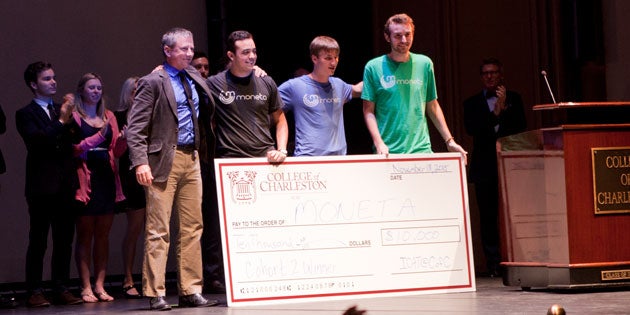Perfect Pitch. That’s not just the name of the entrepreneurial showcase that the Charleston Metro Chamber of Commerce has been orchestrating for 10 years. It’s also what the judges were looking for from 15 teams of entrepreneurs who presented their business ideas to a crowd of 500 at the College’s Sottile Theatre on Wednesday, Nov. 18, 2015. Among those groups were seven student teams from the College of Charleston’s ICAT program (Interdisciplinary Center for Applied Technology), and they wowed the crowd.
The students’ pitches were tremendously varied. They ranged from an e-commerce platform for locally sourced produce, to a system that enables wedding couples to aggregate their guests’ cell phone videos, to a platform that enables college students to readily resell unwanted textbooks. At stake was a grand prize of $10,000.
Each team had one minute to offer a convincing pitch to the judges, and then three finalists were chosen to offer a more in depth, three-minute pitch, followed by questions from the judging panel. The judges selected winners based upon pitch clarity, product viability, and the scalability of the concept.
In the end, it was Christian Ruppe, Hank Stocker and Jared Kopelman – Team Monotto — who prevailed. The trio devised Monotto as an app and online tool that enables individuals to automate financial stability by determining their financial needs and devising the best strategy to help them save and invest. It’s initially targeted as a product for the 1.8 million college students who graduate in the U.S. each spring.
Both Stocker (a computer science major) and Kopelman (a political science major) credited Ruppe (a business administration major) for coming up with the concept, yet Monotto is very much a team effort. “What we ended up with had to evolve through numerous iterations that took most of the semester,” explained Stocker after he and the team accepted the $10,000 check.
Like his teammates, Kopelman was very enthused afterward. He says the team will continue its work on Monotto, using a portion of their winnings to augment the system. “We’ve got really good backend development, but we can use some assistance with the look and user interface of Monotto, and now we have the funds to take care of that.”

Team Wedding Mashers, from left Ian Dilling (as the groom), Lucas Nesi (as the clergy) and Will Wittich (as the bride).
Along with presentations from the ICAT teams, the judges also heard pitches from eight professionals who had been working with Charleston’s Harbor Entrepreneur Center. Those concepts ranged broadly as well, from a novelty toy entrepreneur to an app that facilitates scheduling appointments to the College’s own crew coach Travis Landrith pitching a protection device for rowing shells that he invented – Hydrow.
Chris Starr, who co-founded and directs the ICAT program, says he was impressed by all the pitches and the software execution of the students’ ideas. “But the student pitches in particular were really strong. This is only the second semester of existence for ICAT, but it’s clear that the program has matured because the student pitches were polished and professional, and what they pitched were very viable and scalable products or services.”






